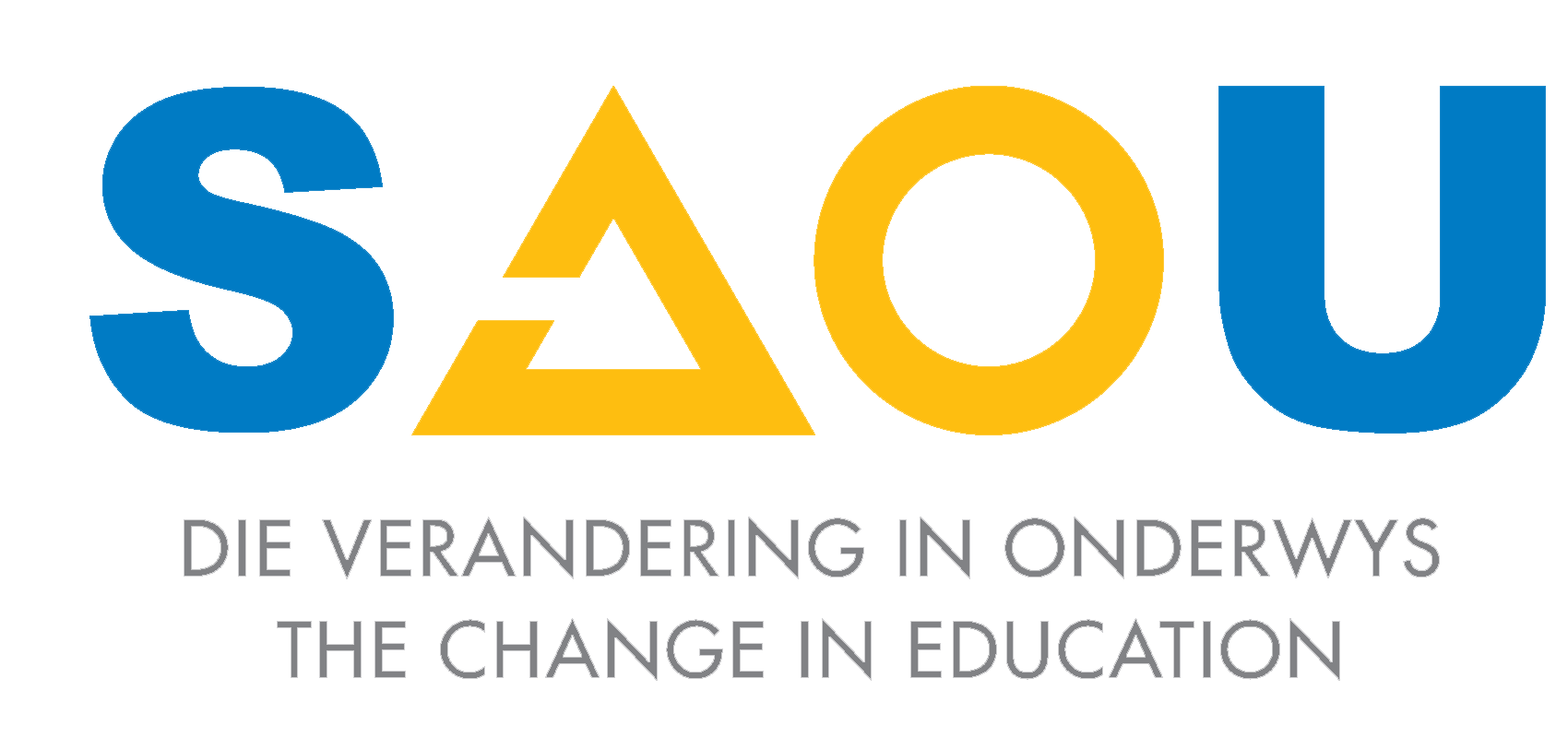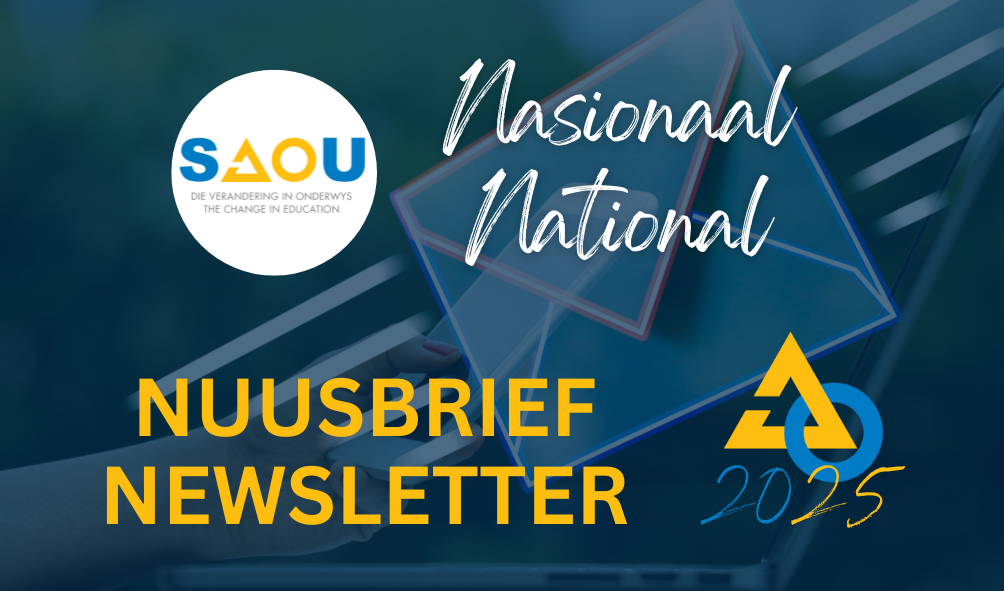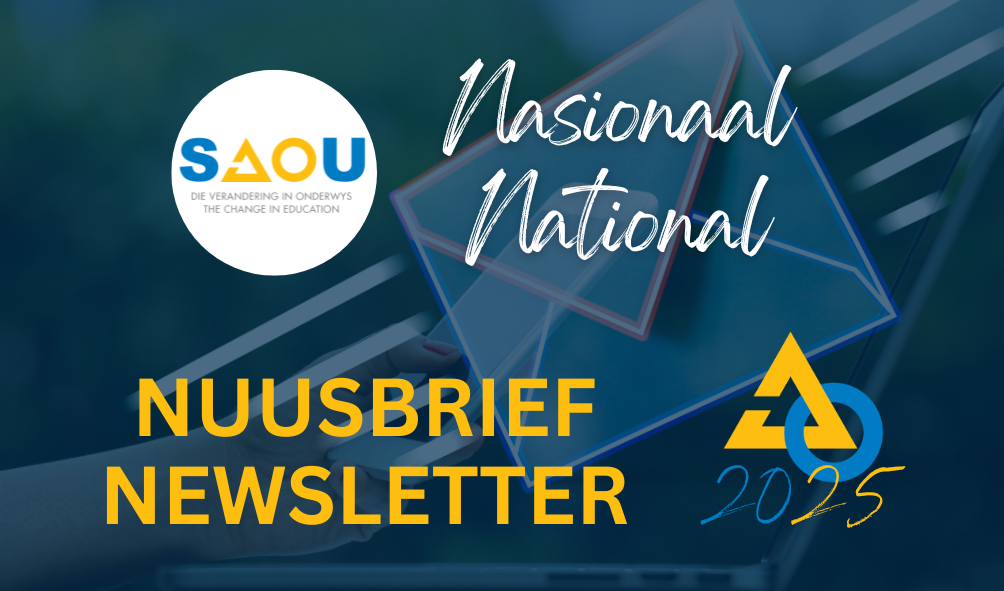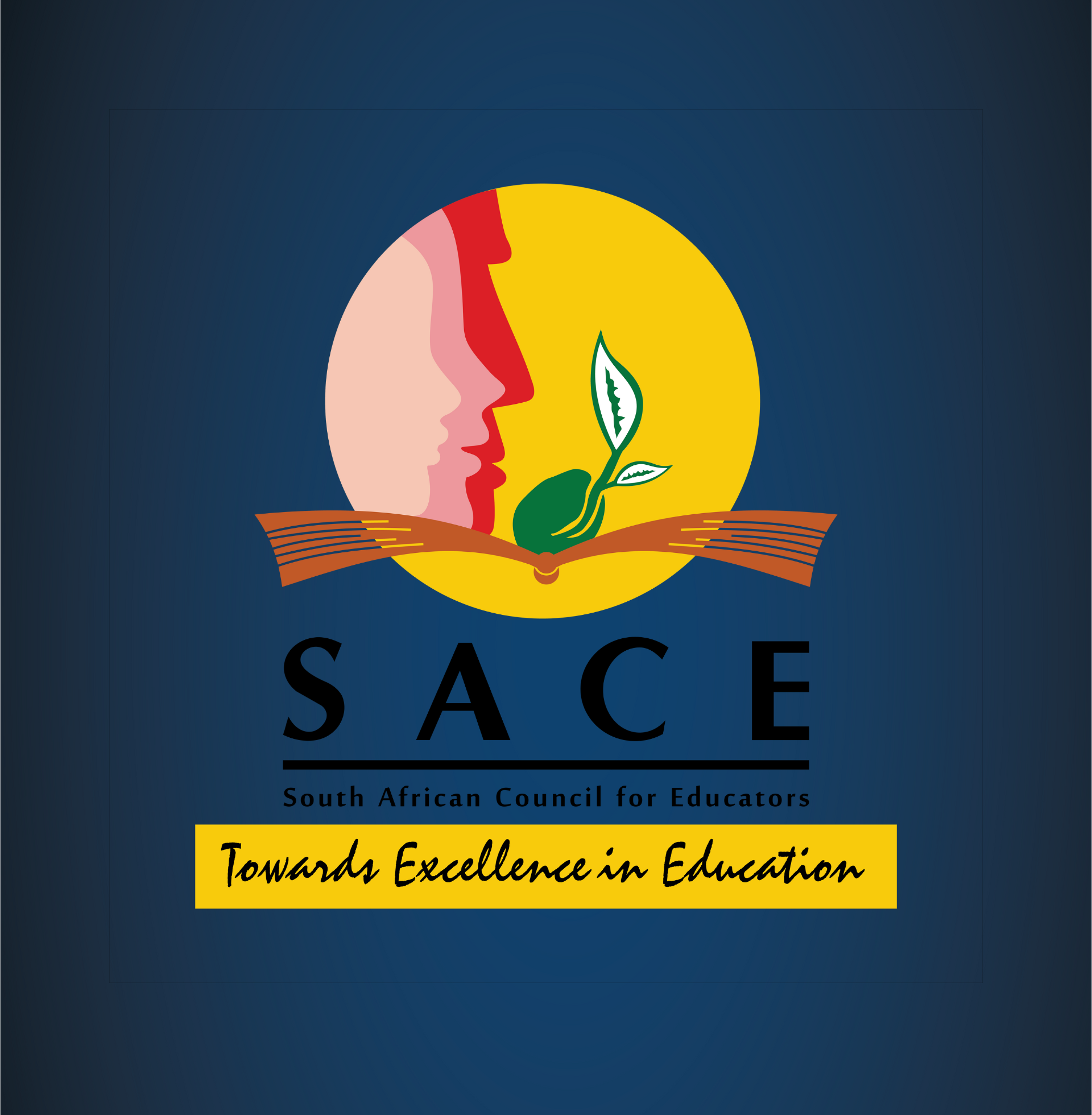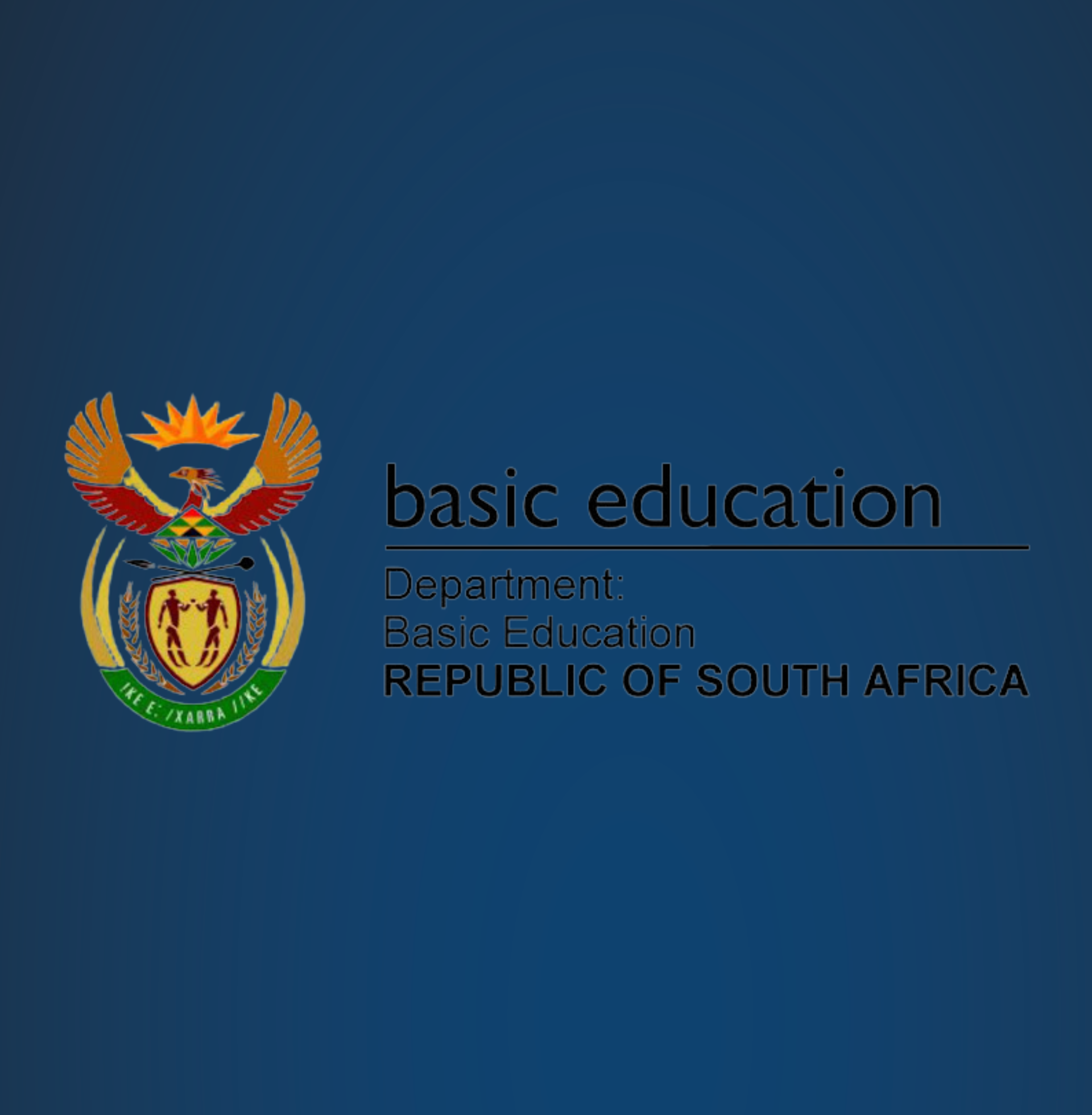
NN 06/2024
SARO-REGISTRASIE
1. Wie moet by SARO registreer?
Opvoeders wat in diens is van:
- Openbare skole;
- Onafhanklike skole;
- FET-instellings;
- ABET/AET- volwasse opleidingsentrums;
- Waldorf en Montessori sentrums;
- Vroeë-kinderontwikkelingsopvoeders wat werksaam is by openbare, sowel as onafhanklike skole en Graad R-leerders onderrig;
- Buitelandse opvoeders in terme van die Raad se 2008 Resolusie;
- Studente opvoeders in terme van die Raad Resolusie van 2006 (SBET Opvoeders);
- Tegniese/professionele/beroepsgerigte spesialiste;
- Sektariese (godsdienstige) opvoeders;
- Terapeute, sielkundiges en maatskaplike werkers; en
- Onderwysstudente.
2. Wanneer moet 'n onderwysstudent aansoek doen vir hul voorlopige SARO-sertifikaat?
Onderwysstudente moet so gou as moontlik vir hul SARO-sertifikaat aansoek doen aangesien dit ‘n lang proses is. Daar moet ook in gedagte gehou word dat ‘n tydelike SARO-sertifikaat slegs vir 12 maande geldig is en dat dit daarna hernu moet word.
Onthou: Die voorlopige SARO-registrasie is nie voldoende vir die aanstelling van ‘n student, as onderwyser nie. In lyn hiermee moet voorlopige SARO-registrasies nie deur skole of werkgewers gesien word as 'n lisensie of magtiging om ongekwalifiseerde onderwysstudente aan te stel nie, behalwe vir kontraktuele doeleindes en in gevalle waar daar formele internskapprogramme in plek is. Slegs opvoeders met ‘n formele onderwyskwalifikasie en SARO-registrasie mag aangestel word.
3. Waarom moet opvoeders by SARO registreer?
Registrasie by SARO is verpligtend vir alle opvoeders om professionele ontwikkeling te bevorder. Dit is ook noodsaaklik om etiese en professionele standaarde vir opvoeders daar te stel, in stand te hou en te beskerm.
4. Watter dokumente word benodig om te registreer?
- SARO-aansoekvorm (beide met heel eerste aansoeke sowel as wysigings);
- ‘n Gesertifiseerde afskrif van jou ID indien jy 'n Suid-Afrikaanse burger is (Afskrif van beide kante indien jy 'n ID-kaart het);
- 'n Geldige paspoort en permit vir buitelandse burgers;
- Die permit moet vir ses maande, of langer geldig wees met aanvang van aansoek by SARO;
- Die bepalings van die permit moet die applikant magtig om in Suid-Afrika te onderrig (onderwysstudente moet studiepermitte indien);
- Kwalifikasies buite die grense van Suid-Afrika verwerf, moet vergesel word deur 'n verslag vanaf die Suid-Afrikaanse Kwalifikasie-owerheid (SAQA);
- 'n Gesertifiseerde matrieksertifikaat of 'n A & O vlak, indien buite Suid-Afrika verwerf;
- 'n Polisieklaringsertifikaat wat nie ouer is as ses maande met aanvang van die aansoek. ‘n Naam- of vingerafdruk-sertifikaat is nie voldoende nie;
- Alle verslae sal geverifieer word en dokumente wat nie verifieerbaar is nie, sal nie aanvaar word nie;
- Gesertifiseerde kwalifikasiesertifikaat bv. B.Ed., NGOS, NPDE, Diploma in Graad R ens.; en
- 'n Volledige, gesertifiseerde akademiese rekord wat aandui dat die kwalifikasie voltooi is, sowel as die datum waarop dit voltooi is en die aantal krediete verwerf. Die akademiese rekord moet op die betrokke tersiêre instansie se briefhoof wees, onderteken wees en deur die instansie gestempel wees.
Klik hier vir die volledige lys van vereistes –afhangende van die kategorie van die aansoek. NB: Maak seker dat jy al die nodige dokumentasie gereed het voordat jy met die aanlynaansoek begin. Alle dokumente, insluitend die bewys van betaling, moet elkeen afsonderlik in PDF-formaat gestoor wees.
5. Wat is die korrekte prosedure om te registreer?
SARO-registrasies kan gedoen word deur die aanwysings aanlyn te volg via www.eservices.gov.za/
- Stap 1: Registreer 'n rekening op die bogenoemde webtuiste;
- Stap 2: Klik op 'Education';
- Stap 3: Klik op 'SACE Professional Teachers Registration'; en
- Stap 4: Volg die aanwysings.
- Registrasiekoste beloop R 200.00 vir SA burgers en R 400.00 vir buitelandse burgers.
6. Is dit moontlik dat die skool my SARO lidmaatskapfooi betaal?
Ja, sommige skole betaal SARO-lidmaatskapfooie namens opvoeders wat deur die SBL aangestel is, sowel as opvoeders wat deur onafhanklike skole of privaatinstellings aangestel is. Die stappe wat geneem moet word is as volg:
- Die skool moet 'n rekening by SARO skep;
- 'n Versoek moet aan SARO gestuur word op die skool se briefhoof;
- 'n Lys met die opvoeders se name, ID- nommers en SARO-registrasienommers moet aangeheg word;
- Dui aan hoe die rekening gehef moet word, nl. maandeliks of jaarliks;
- Die periode van betaling moet aangedui word;
- Neem kennis dat SARO se finansiële jaar vanaf 1 April tot en met 31 Maart loop;
- Daar moet aangedui word vir watter finansiële jaar die betaling gemaak word;
- Die volgende e-posadres moet gebruik word: revenue@sace.org.za;
- SARO sal die skool in kennis stel sodra 'n rekening geskep is;
- Daar sal 'n voorlopige rekening ontvang word;
- Die betaling moet dan aan SARO gemaak word;
- Dit is moontlik om die betaling elektronies te doen. Die rekening nommer wat SARO vir die skool geskep het moet dan as verwysing gebruik word;
- Bewys van betaling moet aan revenue@sace.org.za gestuur word tesame met die lys van opvoeders namens wie die betaling gemaak is;
- Sodra die betaling gemaak is en die bewys van betaling deur SARO ontvang is, sal die skool 'n faktuur ontvang; en
- Indien 'n skool 'n opvoeder wil byvoeg of verwyder vanaf die lys moet revenue@sace.org.za gebruik word om SARO in kennis te stel. Onthou om aan te dui vanaf watter datum die wysiging geldig sal wees. Indien ‘n opvoeder verwyder word voor die termyn van betaling verstryk het, sal die skool 'n kredietnota vanaf SARO ontvang.
7. Hoe kan 'n voornemende opvoeder registreer by SARO voordat sy/haar studies afgehandel is?
'n Voornemende opvoeder kan aanlyn registreer vir 'n voorlopige SARO-sertifikaat deur die aanwysings op die webwerf te volg.
8. Ek is 'n musiek/drama opvoeder Hoe kan ek aansoek doen vir my SARO-sertifikaat?
Wanneer jy vir 'n SARO-sertifikaat aansoek doen, moet jy aansoek doen vir 'n spesiale SARO-sertifikaat wat die veld aandui waarin jy spesialiseer.
9. Wat is 'n spesiale registrasie kategorie?
'n Spesiale registrasie kategorie is van toepassing op opvoeders wat akademies gekwalifiseerd is, maar professioneel ongekwalifiseerd is en as opvoeders aangestel mag word. Die opvoeders mag by SARO geregistreer word onder die kategorie van opvoeders/lektore:
- Opvoeders wat uitvoerende kunste onderrig (musiek, drama, dans en visuele kunste);
- Lektore by TVET-kolleges;
- Praktisyns by gemeenskapsopvoeding en opleidingssentrums (ABET & AET);
- Opvoeders wat godsdiensstudies onderrig;
- Opvoeders aangestel as terapeute, sielkundiges en maatskaplike werkers;
- Opvoeders aangestel by Waldorf- en Montessori sentrums;
- Sekere opvoeders by spesiale skole, vaardigheidskole, fokusskole en tegniese skole;
- Vroeë-kinderontwikkelingsopvoeders met ‘n VKO-kwalifikasie wat NKR-vlak 4 of 5 voltooi het; en
- 'n Volledige lys van die uitsonderings kan gevind word in Hoofstuk B 3.2.1.3 van die PAM.
10. Mag ek klasgee as ek nie professioneel gekwalifiseerd is nie?
Akademies gekwalifiseerde maar professioneel ongekwalifiseerde persone wie, bv. in besit van 'n B.Sc kwalifikasie is en besig is om 'n Nagraadse Onderwyssertifikaat (NGOS) te voltooi, kan voorwaardelik by SARO registreer en mag aangestel word en skoolhou.
Diegene met akademiese kwalifikasies wat nie kwalifiseer om vir ‘n NGOS in te skryf nie, moet vir ‘n Baccalaureus graad in Opvoedkunde (BEd) inskryf.
11. Oor watter kwalifikasie moet die VKO-opvoeder beskik?
’n VKO-opvoeder moet beskik oor ‘n VKO-kwalifikasie op NKR-vlak 4 of 5 van 'n geakkrediteerde instansie.
12. Kan opvoeders wat nie Suid-Afrikaanse burgers is nie (buitelandse opvoeders) by SARO registreer?
Ja, onderworpe aan die volgende voorwaardes (soos vermeld in die Raadsbesluit oor die registrasie van buitelandse opvoeders van 8 Maart, 27 Julie 2006 en 4 Junie 2008):
- Alle buitelandse kwalifikasies moet deur die Departement van Onderwys (DBO) of Suid-Afrikaanse Kwalifikasie-owerheid (SAQA) geëvalueer word voor aansoek gedoen word om registrasie. Die volgende dokumente moet saam met die aansoekvorm ingedien word:
- Gesertifiseerde afskrifte van professionele kwalifikasies. Geldige bewys van wettige toegang tot die land (bv. paspoort, visum of asielsoekers- permit);
- Brief van 'goeie etiese en professionele aansien' (Raad moet die egtheid verifieer); en
- ‘n Brief van indiensneming of hangende indiensneming by 'n skool in Suid-Afrika.
- Daar sal 'n ander proses gevolg word in die geval van vlugtelinge en asielsoekers by indiening van relevante dokumentasie.
- Voorlopige registrasie sal slegs vir 12 maande geldig wees.
- Die registrasiefooi vir buitelandse opvoeders is vasgestel op dubbel die bedrag betaalbaar deur Suid-Afrikaanse burgers.
13. Is daar enige finansiële bydrae wat opvoeders moet maak behalwe die eenmalige registrasiefooi?
Ja, alle opvoeders, skoolbeheerliggaam- aanstellings ingesluit moet 'n maandelikse heffing van R16.50 betaal. Die fooie wat by geregistreerde openbare skole werksaam is, word deur Persal van hul salaris afgetrek. Daar word van daardie opvoeders, wie se fooie nie afgetrek word nie of diegene wie geregistreer is maar nie in diens van die Departement van Onderwys is nie, verwag om self die nodige reëlings vir betaling met SARO te tref.
14. Beteken dit dat ek outomaties geregistreer is as my werkgewer maandeliks R16.50 van my salaris aftrek, ten gunste van SARO?
Nee. Om geregistreer te word moet jy aansoek doen vir registrasie deur die aansoekvorm te voltooi en stawende dokumente in te dien. Elke opvoeder moet in besit van 'n geldige SARO- registrasienommer wees. Geen opvoeder mag onderrig sonder 'n opgedateerde SARO-registrasienommer nie.
15. Kan ek 'n afskrif van my sertifikaat kry as ek myne verloor of misplaas het?
Ja, 'n digitale afskrif van jou sertifikaat kan verkry word. Om jou sertifikaat te vervang moet jy die voltooide vorm, 'n gesertifiseerde afskrif van jou ID-dokument indien en 'n fooi van R50.00 betaal. Klik hier vir die vorm.
16. Hoe lank neem dit vir ‘n opvoeder om geregistreer te word?
Die proses duur ses tot agt weke vir Suid-Afrikaanse opvoeders en drie maande vir buitelandse opvoeders.
17. Wat is die gevolge van dienslewering sonder SARO-registrasie?
- Dissiplinêre stappe teen die nie-geregistreerde opvoeder;
- Dissiplinêre stappe teen die skoolhoof aangesien dit die skoolhoof se verantwoordelikheid is om toe te sien dat slegs SARO-geregistreerde opvoeders leerders onderrig;
- Indien leerders skade ly weens nalatigheid sou ouers verdere stappe teen die skool, asook die nalatige individue, kan oorweeg.
18. Wat is SARO se werksure en kontakbesonderhede?
SARO-kantore is oop van Maandae tot Vrydae vanaf 08:00 tot 16:30 en hul kan by 012 663 9517 telefonies of per e-pos by info@sace.org.za gekontak word.
Neem kennis dat SARO ook ‘n instap-diens by al hul kantore lewer. Onderwysers kan SARO-kantore besoek, hul voltooide registrasiedokumente inhandig en wag totdat die SARO-sertifikaat aan hul uitgereik word.
Klik hier vir meer besonderhede oor die vereistes vir registrasie.
- Bron: SARO-webtuiste en -hulpbronne
SACE REGISTRATION
1. Who must register with SACE?
Educators who are employed at:
- Public Schools;
- Independent schools;
- FET Institutions;
- ABET/AET – Adult Education Centres;
- Waldorf and Montessori centres;
- ECD educators employed in public and independent schools to teach Grade R;
- Foreign educators as per Council Resolution of 2008;
- Trainee teachers as per Council Resolution of 2006 (SBET Educators);
- Technical/ vocational/ occupation specialists;
- Sectarian (religious) educators;
- Therapists, psychologists, social workers; and
- Student teachers.
2. When must a student educator apply for a provisional SACE certificate?
A student educator must apply for a SACE certificate as soon as possible, as the process is lengthy. Keep in mind that a temporary SACE certificate is valid for only 12 months and must be renewed at the end of the period.
Remember: The provisional registration of student teachers by SACE is not sufficient for employment purposes as an educator. In line with this, SACE’s provisional registration for student teachers should not be used by schools or any employer as a licence or permission to employ unqualified student teachers, except for contractual purposes and situations where there is a formal learnership programme in place. Only educators with a formal teaching qualification and SACE registration may be employed.
3. Why must educators register with SACE?
Registration with SACE is compulsory for all educators, to promote professional development. It is also essential to set, maintain and protect ethical and professional standards for educators.
4. What documents do I need to register?
- SACE application form (both first-time applicants and updates);
- A certified copy of ID for SA citizens (Copy of both sides if you have a smart ID card);
- A valid passport and permit for foreign nationals;
- The permit must be valid for a period of six months or more at the time of submission to SACE;
- The conditions of the permit must allow the applicant to teach in South Africa (student teachers must submit study permits);
- An evaluation report from the South African Qualifications Authority (SAQA) for all qualifications obtained outside the Republic of South Africa;
- A certified matric certificate or A & O Level, if obtained outside the Republic of South Africa;
- A police clearance certificate that is not older than six months at the time of submission. A name or finger print clearance is not sufficient;
- All documents will be verified and unverifiable documents will not be accepted;
- Certified qualification certificates; for example, B.Ed., PGCE, NPDE, Diploma in Grade R teaching etc.; and
- A complete, certified academic record indicating that the qualification has been completed, together with the date of completion and the number of credits obtained. The academic record should be on the letterhead of the Higher Education Institution concerned. It should be signed and bear the stamp of the institution.
Click here to view the complete list of requirements – depending on the category of application. NB: Ensure that you have all the necessary documentation ready, before you start with the online application. All documents; including the proof of payment should be saved individually in PDF format.
5. What is the correct procedure to register?
SACE registrations can be done by following the prompts online via www.eservices.gov.za/
- Step 1: Register an account on the above-mentioned website;
- Step 2: Click on ‘Education’;
- Step 3: Click on ‘SACE Professional Teachers Registration’; and
- Step 4: Follow the prompts.
- Registration costs R 200.00 for SA citizens and R 400.00 for foreign nationals.
6. Is it possible for the school to pay my SACE membership fees?
Yes, some schools pay SACE membership fees for educators appointed by the SGB, as well as for educators at independent schools or other private institutions. The following steps need to be taken:
- The school must create an account with SACE;
- A request on the school’s letterhead must be sent to SACE;
- A list with the names of the educators, their ID numbers and their SACE numbers must be attached;
- Indicate whether the account should be debited monthly or annually;
- State the duration of the period for which you are paying;
- Note that SACE’s financial year runs from 1 April to 31 March each year;
- You must indicate for which financial year you are paying;
- Use the following email address: revenue@sace.org.za ;
- SACE will notify the school once the account has been created;
- You will receive a pro-forma invoice;
- Payment must then be made to SACE;
- An EFT payment option is available for schools. Use the account number that SACE created for the school as reference;
- Send proof of payment to: revenue@sace.org.za and attach the list with the names of the educators for whom the payment is being made;
- Once a payment has been made and proof of payment has been received by SACE, the school will receive a tax invoice from SACE; and
- If the school wants to remove or add an educator to the list, use revenue@sace.org.za to inform SACE. Remember to indicate from which date the removal or addition is valid. If an educator is removed before the term of payment has lapsed, SACE will send a credit note to the school.
7. How can a prospective educator who is still busy completing a degree in Education register at SACE?
A prospective teacher can register online for a provisional SACE certificate by following the prompts on the website.
8. I am a music/drama educator. How do I apply for my SACE certificate?
When applying for a SACE certificate you need to apply for a special SACE registration certificate which indicates your field of specialisation.
9. What is a special registration category?
The special registration category applies to educators who are academically qualified but professionally unqualified and who may be appointed in an education post. These educators may be registered by SACE under this category and includes the following educators/ lecturers:
- Educators who teach performing arts (music, drama, dance and visual art);
- Lecturers at TVET Colleges;
- Practitioners at Community Education and Training Centres (ABET & AET);
- Educators who teach religious studies;
- Educators appointed as therapists, psychologists and social workers at schools;
- Educators at Waldorf and Montessori Schools;
- Certain educators at special schools, schools of skills, focus schools, technical schools.;
- ECD practitioners who completed an ECD qualification on NQF level 4 or level 5; and
- A complete list of the exceptions can be found in Chapter B.3.2.1.3 of the PAM.
10. Am I allowed to teach if I am not professionally qualified?
Academically qualified but professionally unqualified persons who, e.g. are in possession of a B.Sc. qualification and studying towards a post graduate certificate in education (PGCE), can register conditionally with SACE, may be appointed and are allowed to teach.
Those with academic qualifications who do not qualify to enrol for a PGCE must enrol for a Bachelor of Education (BEd).
11. What qualification should the ECD educator possess?
An ECD qualification at NQF level 4 or 5 from an accredited institution.
12. Can educators who are not South African Nationals (foreign educators) register?
Yes, but subject to the following conditions (as stated in the Council Resolution on the registration of foreign educators of 8 March, 27 July 2006 and 4 June 2008):
- All foreign qualifications must be evaluated by the Department of Education (DoE) or South African Qualifications Authority (SAQA) before application for registration. The following documents should be submitted together with the application form:
- Certified copies of professional qualifications. Valid Proof of legal entry into the country (e.g. passport, visa, asylum seekers permit);
- Letter of 'good ethical and professional standing' (Council must verify the authenticity); and
- Letter of employment or pending employment at a school based in South Africa.
- A different process will be followed for refugees and asylum seekers on submission of relevant documentation.
- Provisional registration will be valid for 12 months only.
- The registration fee for foreign educators is set at double the amount payable by South African nationals.
13. Is there any financial contribution educators have to make apart from the once-off registration fee?
Yes, all educators, school governing appointments included, must pay a monthly levy of R16.50. The fees of educators employed by the Department of Education are deducted by Persal from their salaries. Educators whose fees are not being deducted or those who are registered but not employed by the Department of Education, are required to make necessary arrangements for payment with SACE themselves.
14. Does it mean that I am automatically registered if my employer deducts R16.50 monthly in favour of SACE from my salary?
No. To be registered you have to apply for registration by completing the application form and submitting supporting documents. Every educator must be in possession of a valid SACE registration number. No educator is allowed to teach without a valid, updated SACE registration number.
15. Can I get a copy of my certificate if I lose or misplace mine?
Yes, a digital copy of your certificate can be obtained. In order to replace your certificate, you need to submit the completed application form, a certified copy of your ID document and a fee of R50.00. Click here for the form.
16. How long does it take for an educator to be registered?
The process takes about six to eight weeks for South African educators and three months for foreign educators.
17. What are the consequences of service delivery without SACE-registration?
- Disciplinary action against the non-registered educator;
- Disciplinary steps against the principal as it is the principal’s responsibility to ensure that only SACE registered educators are teaching;
- If learners suffer damage due to negligence, parents will be able to consider further steps against the school as well as the negligent individuals.
18. What are the working hours and contact details of SACE?
SACE offices are open from Mondays to Fridays from 08:00 to 16:30 and they can be reached telephonically at 012 663 9517 or via email on info@sace.org.za.
Note that SACE also provides a walk-in service at all their offices. Educators can visit SACE offices, submit their completed registration documents and wait until their SACE certificate is issued.
Click here for more information on the registration requirements.
Source:
- SACE
website and resources




